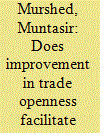| Srl | Item |
| 1 |
ID:
161485


|
|
|
|
|
| Summary/Abstract |
The aim of this article is to empirically shed light on the impacts of trade openness (TO) on facilitation of renewable energy transition (RET) across Bangladesh, India, Pakistan, Sri Lanka and Nepal. Against this backdrop, this article incorporated annual time series data stemming from 2000 to 2017 and employed the two-stage least squares (2SLS) panel data estimation methodology. In addition, the panel Granger causality test was also applied to distinguish the possible long-run causal associations between the variables considered in the regression models. In the light of the estimated results, it is found that an improvement in TO triggers renewable energy consumption, improves the primary energy-use efficiency and elevates the access to clean cooking fuel technology within the selected South Asian economies. However, the results also led to the concerning conclusion regarding the ineffectiveness of the trade liberalization policies in curbing the relative consumption of non-renewable energy resources, thereby marginalizing the prospects of overall RET within these economies.
|
|
|
|
|
|
|
|
|
|
|
|
|
|
|
|
| 2 |
ID:
175928


|
|
|
|
|
| Summary/Abstract |
In the 14 years from 2004 to 2018, the state of South Australia underwent a sustainability transition that saw its privately owned and operated electricity system change from 100% fossil fuel generation to a position where 50% was generated by wind and solar. However, this transition has not been without controversy. Most notably, in 2016 and again in 2017, the state was hit with major blackouts that many powerful individuals and organisations blamed on the renewables transition. The result of these blackouts and the substantial political fallout from them was the formulation and release of a new energy policy in 2017. Via a series of interviews with actors directly involved with the formulation of this new policy and an analysis of other sources attached to the state’s renewables transition, this article reflects upon the elements and motivations that made and continue to make the renewables transition in South Australia successful. In particular, the research shows that when renewables establish a critical mass of generation, they produce a path dependent trajectory that is difficult to alter. In conclusion, the experience of South Australia demonstrates a means by which renewables transitions can be expedited by public policy initiatives in a privatised market system.
|
|
|
|
|
|
|
|
|
|
|
|
|
|
|
|